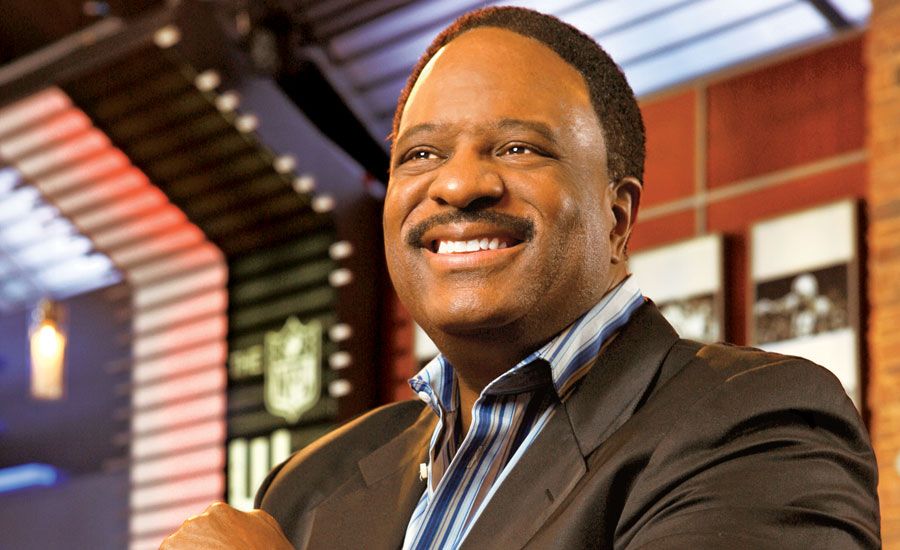Is there a sports fan in your home?
If so you may recognize me from TV on football Sundays. I host The NFL Today show on CBS.
Because of my big six-five frame, people assume I played football. Actually, my sport was basketball.
There was a time—well before I got into broadcasting—when I was just as tall but lean and lanky. I played college ball, and thought I was going to make my mark in the NBA. Things didn’t work out.
The Atlanta Hawks, the NBA team that drafted me, cut me before the 1973-74 season began. I cried when the coach sent me packing. I cried on the plane home to Washington, D.C. For two weeks, I holed up in my old bedroom at my parents’ house, wondering, If I’m not a basketball player, then who am I?
What I discovered was that the way you picked yourself up from even the most devastating setbacks was by using the three tools my parents had instilled in me: commitment, a strong work ethic and faith, the keys to integrity in any field. Without them, I would never have found my way to the broadcast booth, to the job I love.
Let’s go to the tape:
1. Commitment
“You have to stand for something if you’re to be anyone at all,” my mother was always saying.
Though my parents didn’t go to college, they were two of the smartest people I knew, and were determined to make sure their kids got a good education. They made incredible sacrifices to send me and two of my siblings to private school, and four of us to college. My dad worked two, sometimes three, jobs to pay the tuition. (I still don’t know how he did it.)
All they wanted in return was a promise that we wouldn’t waste the opportunity they gave us.
I worked hard in school—as hard as I did on the basketball court—and near the end of my senior year received a recruiting letter from Harvard. Mom was overcome with joy.
I went to Massachusetts to visit the campus and meet the basketball coach. Looking up at the buildings, I could almost feel the weight of the knowledge that had been passed along over the years. This is everything my parents and I have been working for.
Back home, I phoned the coach. “I’m committing to Harvard,” I said.
Then I got a letter from UCLA, winner of 10 national championships in 11 years, a college basketball dynasty. John Wooden, the team’s legendary coach, was inviting me to visit. You gotta be kidding. Kareem Abdul-Jabbar played at UCLA, and they want me!
“I want to play basketball,” I told my folks. I explained that UCLA would be my ticket to the NBA.
My parents were unmoved. “You gave Harvard your word you were coming,” Mom said. “You’ll stand by your word. There’s a bigger picture here.” At the time I didn’t understand what my parents were getting at, but I do now. Mom was right. If you want to be someone, you’ve got to honor your commitments.
2. Hard work
I didn’t have to look far for a role model when it came to work ethic. My father, John Brown, reminded me of Joseph in the New Testament. He was the backbone of our family. He worked multiple jobs—a taxi driver, a corrections officer, a rental car worker, a postal worker—to support us. “Nothing good comes easy,” he told me.
I took that attitude onto the basketball court. Believe me when I tell you I had no polished skills. But like a lot of kids, I harbored NBA dreams.
The summer after eighth grade I attended a basketball camp run by Morgan Wootten, the high school varsity coach. One day I worked up my nerve and asked what I needed to do to become a good basketball player.
“How good?” he asked.
I confided my secret dream. “Good enough to play in the NBA.”
Coach Wootten studied me. “If you want to become an All-County player, then here’s what you have to work on,” he said, and rattled off a list of drills. “If you want to make All-State, then you have to master these things too,” and he listed a bunch more skills. And so on, up the line, till he got to what it takes to make the NBA. “There’s no shortcut,” he said.
That summer my parents knew where to find me: on the asphalt basketball court behind St. Ann’s Infant & Maternity Home. I had it all to myself. All day I practiced Coach Wootten’s drills.
By sophomore year I was a different player. Coach Wootten picked me for varsity, and I made the starting lineup. My parents could see a change in me too. I wasn’t boastful. That wasn’t allowed in our home. But I was confident in a way I’d never been before. It must’ve shown. The way Mom looked at me, I knew she could tell I had a new purpose.
The next two years I worked like crazy. “Hey, why don’t you put down that ball and hang with us?” friends asked.
“Gotta practice,” I said. Alone on the court behind St. Ann’s, I thought, Nobody is going to outwork me. I know what I have to do to make it to the NBA.
Then I got to Harvard. Suddenly there were all these distractions. Coeds. It was the early 1970s and there were protests, teach-ins. The great city of Boston was just a subway ride away.
“You can shoot hoops later,” my new buddies said. For the first time in my life, I said, “Okay.”
I was a good player in college, but not nearly as good I should’ve been. Though the Hawks drafted me, I could never catch up to all those other players who, unlike me, had never lost their focus.
That’s what I realized during those two weeks I hibernated in my old bedroom after the Hawks cut me. I swore I’d never waste my talents again. I’ve worked as hard as I can every day since. It’s why I made it to The NFL Today.
3. Faith
Trials come into every life, so you’ve got to have something bigger and deeper to sustain you.
After my brief stint in the NBA, I worked as a sales manager for Xerox. I was making good money, had all the trappings of success—nice apartment, nice car. But I wasn’t particularly happy.
One night, driving home from a sales seminar, I was overcome by a feeling of emptiness. I’d done some partying with my colleagues after the seminar. It wasn’t really my thing. I was just going along to get along. We salesmen were supposed to be friends, but many of us were looking for a shortcut to the top, even if it meant stepping over someone else. When did I become a guy who was only out for himself?
I braked and pulled over. Turned off the engine. I sat in my car, thinking of how far I’d drifted from the values my parents had taught me.
My folks had raised us as Christians, but I knew the Lord from the head, not the heart. On that deserted road, I found myself praying. God, I don’t like who I am or what I’m doing. If you come into my life, I’ll give my life to you and follow you as best I can.
That sense of emptiness left me, and peace took its place.
Not long after that, out of the blue, I got an opportunity to work in broadcasting, covering NBA games for a local TV station. I’d never really considered a career in broadcasting, but right away, I loved it, loved being involved in sports again, loved the teamwork with the other guys in the booth.
Was it just coincidence that I discovered my path once I opened my heart to God? I don’t think so. That’s why to this day, before I go on the air, I pray for the strength to do a good job, pray to the One who guided me there.
Did you enjoy this story? Subscribe to Guideposts magazine.





